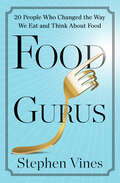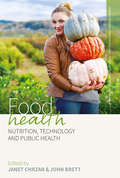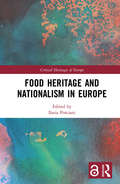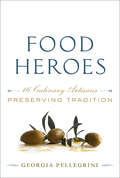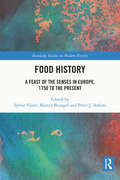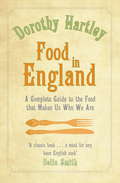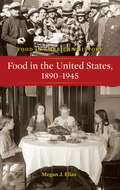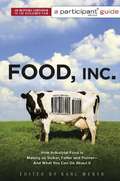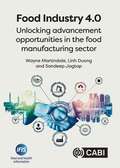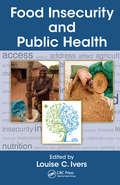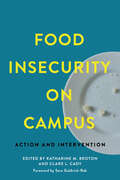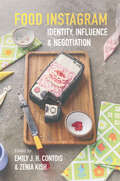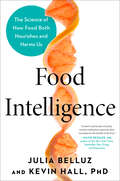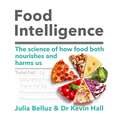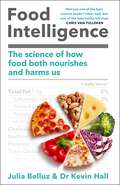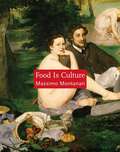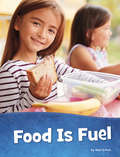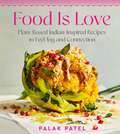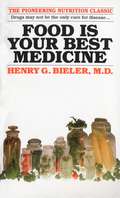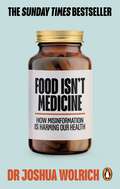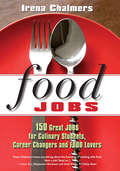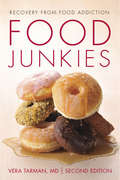- Table View
- List View
Food Gurus: 20 People Who Changed the Way We Eat and Think About Food
by Stephen VinesA fascinating overview of culinary history exploring the lives of twenty people who have impacted the way we dine. &“An intriguing dip into the lives and obsessions of an eclectic round up of ancient and modern food heroes whose tastes affect ours. Easy to digest, great recipes and some surprises.&” —Lindsey Bareham, The Times (London) Centuries ago, humankind thought of food as mere sustenance, but over time, it has evolved into something bigger. Now single dishes and entire cuisines can become trendy, cultural phenomena and media obsessions around the world. Why? How did we get here? Throughout history, there have been individuals who, for better or worse, have transformed how we eat and how we think about what we eat. In Food Gurus, author Stephen Vines delves into the culinary past and examines the careers and legacies of twenty of these influential people. They are chefs, writers, entrepreneurs, and other icons of the food world. Vines discusses each guru&’s personal journey, their character and passion, and the social events and history that shaped their approach to food. There are even recipes to better illustrate the type of cooking they produced—or had someone make for them. Among the gurus are the inventor of molecular gastronomy, Ferran Adria; one of Britain&’s most influential cookery writers, Isabella Beeton; the &“mother of American cooking&” and voice for sustainable agriculture, Alice Waters; and food industry innovator and entrepreneur Henry Heinz. Other featured gurus include: Robert Atkins James Beard Paul Bocuse Antonin Carême Julia Child Elizabeth David Raymond &“Ray&” Kroc Catherine de Medici Jamie Oliver Gordon Ramsay And more! Whether you enjoy history, eating, or sociology, Food Gurus has something to sate your appetite. &“[Vines&’s] choice of gurus is canny, amusing and well-researched, telling the reader not only about his heroes&’ virtues but also their clay feet.&” —Paul Levy, co-author of The Official Foodie Handbook
Food Health: Nutrition, Technology, and Public Health (Research Methods for Anthropological Studies of Food and Nutrition #3)
by John Brett Janet ChrzanNutritional Anthropology and public health research and programming have employed similar methodologies for decades; many anthropologists are public health practitioners while many public health practitioners have been trained as medical or biological anthropologists. Recognizing such professional connections, this volume provides in-depth analysis and comprehensive review of methods necessary to design, plan, implement and analyze public health programming using anthropological best practices. To illustrates the rationale for use of particular methods, each chapter elaborates a case study from the author's own work, showing why particular methods were adopted in each case.
Food Heritage and Nationalism in Europe (Critical Heritages of Europe)
by Ilaria PorcianiFood Heritage and Nationalism in Europe contends that food is a fundamental element of heritage, and a particularly important one in times of crisis. Arguing that food, taste, cuisine and gastronomy are crucial markers of identity that are inherently connected to constructions of place, tradition and the past, the book demonstrates how they play a role in intangible, as well as tangible, heritage. Featuring contributions from experts working across Europe and beyond, and adopting a strong historical and transnational perspective, the book examines the various ways in which food can be understood and used as heritage. Including explorations of imperial spaces, migrations and diasporas; the role of commercialisation processes, and institutional practices within political and cultural domains, this volume considers all aspects of this complex issue. Arguing that the various European cuisines are the result of exchanges, hybridities and complex historical processes, Porciani and the chapter authors offer up a new way of deconstructing banal nationalism and of moving away from the idea of static identities. Suggesting a new and different approach to the idea of so-called national cuisines, Food Heritage and Nationalism in Europe will be a compelling read for academic audiences in museum and heritage studies, cultural and food studies, anthropology and history. Chapters 1,2,4,6 and 12 of this book are available for free in PDF format as Open Access from the individual product page at www.routledge.com. They have been made available under a Creative Commons Attribution-Non Commercial-No Derivatives 4.0 license
Food Heroes: 16 Culinary Artisans—Preserving Tradition
by Georgia PellegriniFrom chef, author, and host of Modern Pioneering, a cookbook featuring essays about food artisans committed to local, wild and non-processed cuisine. In Food Heroes, Georgia Pellegrini introduces readers to the lively stories of artisanal food devotees such as New York mushroom forager Marion Burroughs, French fig collector Francis Honore, fish missionary Jon Rowley in Washington State, and Ugo Buzzio in New York City, one of the last makers of traditional dry-cured sausages in the United States. Filled with colorful anecdotes, photographs, and recipes, this book offers an accessible introduction to the artisanal food movement, and vicarious living for armchair travelers, food lovers, and others who might wonder what it would be like to drop everything and start an olive farm, or who yearn to make and sell their own clotted cream butter. Thirty-two fantastic recipes follow the profiles, and encourage readers to find their own local suppliers.
Food History: A Feast of the Senses in Europe, 1750 to the Present (Routledge Studies in Modern History)
by Martin Bruegel Peter J. Atkins Sylvie VabreThis pioneering book elevates the senses to a central role in the study of food history because the traditional focus upon food types, quantities, and nutritional values is incomplete without some recognition of smell, touch, sight, hearing, and taste. Eating is a sensual experience. Every day and at every meal the senses of smell, touch, sight, hearing, and taste are engaged in the acts of preparation and consumption. And yet these bodily acts are ephemeral; their imprint upon the source material of history is vestigial. Hitherto historians have shown little interest in the senses beyond taste, and this book fills that research gap. Four dimensions are treated: • Words, Symbols and Uses: Describing the Senses – an investigation of how specific vocabularies for food are developed. • Industrializing the Senses – an analysis of the fundamental change in the sensory qualities of foods under the pressure of industrialization and economic forces outside the control of the household and the artisan producer. • Nationhood and the Senses – an exploration of how the combination of the senses and food play into how nations saw themselves, and how food was a signature of how political ideologies played out in practical, everyday terms. • Food Senses and Globalization – an examination of links between food, the senses, and the idea of international significance. Putting all of the senses on the agenda of food history for the first time, this is the ideal volume for scholars of food history, food studies and food culture, as well as social and cultural historians. Putting all of the senses on the agenda of food history for the first time, this is the ideal volume for scholars of food history, food studies and food culture, as well as social and cultural historians.
Food Hydrocolloids as Encapsulating Agents in Delivery Systems
by Adil Gani F. A. Masoodi Umar Shah Shah AsimaThis book addresses the use of food hydrocolloids as agents for encapsulating biological active ingredients. It details the challenges of poorly-controlled rate of hydration, thickness, decrease in viscosity upon storage, and susceptibility to microbial contamination. Food Hydrocolloids as Encapsulating Agents in Delivery Systems briefly describes various emerging biomaterials including food gums, starches, beta glucans, and proteins for their potential role as wall material in the development of nutraceutical delivery systems. Further, it describes different techniques of fabrication of nanodelivery systems. Features: Provides an introduction to food hydrocolloids as encapsulating agents Covers starches and their derivatives as delivery systems Includes gum-based delivery systems Discusses the classification, isolation, and purification of protein delivery systems This book would be helpful to food scientists and pharmaceutical scientists working in areas including nanotechnology, polymer chemistry, and nutraceutical delivery, as well as regulators and government researchers in US FDA, USDA, and UK FSA regulatory agencies.
Food In England: A complete guide to the food that makes us who we are
by Dorothy HartleyDorothy Hartley's FOOD IN ENGLAND became an instant classic when it was first published in 1954, and has had a deep influence on countless English cooks and food writers since.Hartley's love of the infinite variety of English cooking and her knowledge of British culture and history show why our food should never be considered dull or limited. There are unusual dishes such as the Cornish Onion and Apple Pie, and she describes some delicious puddings, cakes and breads, including an exotic violet flower ice cream, an eighteenth century coconut bread and Yorkshire teacakes.An irresistible window into centuries of culture, and illuminated with Hartley's own lively illustrations, FOOD IN ENGLAND is an unforgettable tour through culinary history and a unique insight into England's past.
Food In England: A complete guide to the food that makes us who we are
by Dorothy HartleyDorothy Hartley's FOOD IN ENGLAND became an instant classic when it was first published in 1954, and has had a deep influence on countless English cooks and food writers since.Hartley's love of the infinite variety of English cooking and her knowledge of British culture and history show why our food should never be considered dull or limited. There are unusual dishes such as the Cornish Onion and Apple Pie, and she describes some delicious puddings, cakes and breads, including an exotic violet flower ice cream, an eighteenth century coconut bread and Yorkshire teacakes.An irresistible window into centuries of culture, and illuminated with Hartley's own lively illustrations, FOOD IN ENGLAND is an unforgettable tour through culinary history and a unique insight into England's past.
Food In The United States, 1890-1945
by Megan J. EliasFrom the Gilded Age to the end of World War II, what, where, when, and how Americans ate all radically changed. Migration to urban areas took people away from their personal connection to food sources.
Food Inc.: How Industrial Food is Making Us Sicker, Fatter, and Poorer-And What You Can Do About It
by Karl WeberFood, Inc. is guaranteed to shake up our perceptions of what we eat. This powerful documentary deconstructing the corporate food industry in America was hailed by Entertainment Weekly as “more than a terrific movie—it’s an important movie.” <P><P> Aided by expert commentators such as Michael Pollan and Eric Schlosser, the film poses questions such as: Where has my food come from, and who has processed it? What are the giant agribusinesses and what stake do they have in maintaining the status quo of food production and consumption? How can I feed my family healthy foods affordably?<P> Expanding on the film’s themes, the book Food, Inc. will answer those questions through a series of challenging essays by leading experts and thinkers. This book will encourage those inspired by the film to learn more about the issues, and act to change the world.
Food Industry 4.0: Unlocking Advancement Opportunities in the Food Manufacturing Sector
by Dr Wayne Martindale Dr Linh Duong Dr Sandeep JagtapThis book provides industry insights and fresh ideas for the advancement of the most vital global industry - food. Drawing on their industry and academic expertise the authors have identified three controlling aspects of food business operations that can unleash long term success: consumer health and wellbeing; product and process sustainability; and harnessing advances in digitalization.. If developed to their maximum potential these factors have the capability to revolutionize the food sector. Food Industry 4.0 highlights advancement opportunities for the food manufacturing sector, including innovation in products, processes and services, as it seeks to combine productive, efficient and sustainable practices. The contents address: Mapping data, new approaches for food system applications. The perfect meal and making a balanced global diet possible. Industry 4.0 applications in the food sector: robotics and automation, big data, Internet of Things, cybersecurity. Resource utilization in the food manufacturing sector. Resilience and sustainability in food supply chains. Environmental and social governance in our food system. It is of significant benefit to food industry practitioners working in operational and product development roles, academic researchers, policy makers, students, and food sector professionals.
Food Insecurity and Public Health
by Louise IversAffecting more than 800 million people, food insecurity is a global problem that runs deeper than hunger and undernutrition. In addition to the obvious impact on physical well-being, food insecurity can result in risky coping strategies, increased expenditures on medical costs or transportation, and mental health issues. A review of the concepts an
Food Insecurity on Campus: Action and Intervention
by Katharine M. Broton and Clare L. CadyThe hidden problem of student hunger on college campuses is real. Here's how colleges and universities are addressing it.As the price of college continues to rise and the incomes of most Americans stagnate, too many college students are going hungry. According to researchers, approximately half of all undergraduates are food insecure. Food Insecurity on Campus—the first book to describe the problem—meets higher education's growing demand to tackle the pressing question "How can we end student hunger?" Essays by a diverse set of authors, each working to address food insecurity in higher education, describe unique approaches to the topic. They also offer insights into the most promising strategies to combat student hunger, including• utilizing research to raise awareness and enact change; • creating campus pantries, emergency aid programs, and meal voucher initiatives to meet immediate needs;• leveraging public benefits and nonprofit partnerships to provide additional resources;• changing higher education systems and college cultures to better serve students; and• drawing on student activism and administrative clout to influence federal, state, and local policies.Arguing that practice and policy are improved when informed by research, Food Insecurity on Campus combines the power of data with detailed storytelling to illustrate current conditions. A foreword by Sara Goldrick-Rab further contextualizes the problem. Offering concrete guidance to anyone seeking to understand and support college students experiencing food insecurity, the book encourages readers to draw from the lessons learned to create a comprehensive strategy to fight student hunger.Contributors: Talia Berday-Sacks, Denise Woods-Bevly, Katharine M. Broton, Clare L. Cady, Samuel Chu, Sarah Crawford, Cara Crowley, Rashida M. Crutchfield, James Dubick, Amy Ellen Duke-Benfield, Sara Goldrick-Rab, Jordan Herrera, Nicole Hindes, Russell Lowery-Hart, Jennifer J. Maguire, Michael Rosen, Sabrina Sanders, Rachel Sumekh
Food Instagram: Identity, Influence, and Negotiation
by Michael Z. Newman Rachel Phillips Yi-Chieh Jessica Lin Jonatan Leer Katherine Kirkwood Joceline Andersen Laurence Allard Emily Buddle Robin Caldwell Sarah Cramer Gaby David Sara Garcia Santamaria Deborah Harris Kc Hysmith Alex Ketchum Yue-Chiu Bonni Leung Tsugumi Okabe Tara Schuwerk Stinne Gunder Krogager Sarah E Tracy Emily Truman Dawn Woolley Zara WorthImage by image and hashtag by hashtag, Instagram has redefined the ways we relate to food. Emily J. H. Contois and Zenia Kish edit contributions that explore the massively popular social media platform as a space for self-identification, influence, transformation, and resistance. Artists and journalists join a wide range of scholars to look at food’s connection to Instagram from vantage points as diverse as Hong Kong’s camera-centric foodie culture, the platform’s long history with feminist eateries, and the photography of Australia’s livestock producers. What emerges is a portrait of an arena where people do more than build identities and influence. Users negotiate cultural, social, and economic practices in a place that, for all its democratic potential, reinforces entrenched dynamics of power. Interdisciplinary in approach and transnational in scope, Food Instagram offers general readers and experts alike new perspectives on an important social media space and its impact on a fundamental area of our lives. Contributors: Laurence Allard, Joceline Andersen, Emily Buddle, Robin Caldwell, Emily J. H. Contois, Sarah E. Cramer, Gaby David, Deborah A. Harris, KC Hysmith, Alex Ketchum, Katherine Kirkwood, Zenia Kish, Stinne Gunder Strøm Krogager, Jonathan Leer, Yue-Chiu Bonni Leung, Yi-Chieh Jessica Lin, Michael Z. Newman, Tsugumi Okabe, Rachel Phillips, Sarah Garcia Santamaria, Tara J. Schuwerk, Sarah E. Tracy, Emily Truman, Dawn Woolley, and Zara Worth
Food Intelligence: The Science of How Food Both Nourishes and Harms Us
by Julia Belluz Kevin Hall PhD&“Food Intelligence dispels many popular myths we have about weight loss and breaks down the real drivers of the obesity crisis based on decades of research. I really hope everyone gets a chance to read this book." —Sanjay Gupta, MD, Chief Medical Correspondent at CNN and host of Chasing Life The essential guide for understanding what you&’re eating, and the forces that are driving you to eat it.Nutrition isn&’t rocket science; it&’s harder.There are new diet fads, bold claims about superfoods and articles promising the secrets to lasting weight-loss and longevity. The more &‘expert&’ advice we hear about diet, the less clarity we have about what to eat.In Food Intelligence, award-winning health journalist, Julia Belluz, and internationally renowned nutrition and metabolism scientist, Kevin Hall, cut through the myths about nutrition to deliver a comprehensive book on food, diet, metabolism and healthy eating.Breaking food down into its constituent parts, Food Intelligence reveals:The real science behind how protein, fat, carbs and vitamins impact our bodiesThe wonders of metabolismThe latest &‘theories&’ about blood sugar trackers and ultra-processed foodsHow our food environment shapes our eating behaviors and the food choices we make every dayHow diseases like obesity and type 2 diabetes are not a result of a failure of will power; they are consequences of food systems working as designedHumane and deeply reported, this journey into the science of what we eat will equip you with the food intelligence you need to better understand what&’s on your dinner plate, how it got there, and why you eat it.
Food Intelligence: The Science of How Food Both Nourishes and Harms Us
by Julia Belluz Kevin Hall, PhD'This is not just one of the best science books I have read, but one of the best books full stop' - Chris van Tulleken, author of the Sunday Times bestseller ULTRA-PROCESSED PEOPLE'Junk-food giants hijack your biology. Wellness hucksters sell you false hope. In a food environment rigged against you, this is your guide to fighting back.' Henry Dimbleby, author of the Sunday Times bestseller RAVENOUS, and architect of the UK's National Food Strategy.'A must-read . . . written with great expertise' - David Kessler, author of the New York Times bestseller DIET, DRUGS, AND DOPAMINE'If you are going to read one book about nutrition and health, then make it this one' - Deborah Blum, Pulitzer-Prize winning author of THE POISON SQUADNutrition isn't rocket science; it's harder.There are new diet fads, bold claims about superfoods and articles promising the secrets to lasting weight-loss and longevity. The more 'expert' advice we hear about diet, the less clarity we have about what to eat.In Food Intelligence, award-winning health journalist, Julia Belluz, and internationally renowned nutrition and metabolism scientist, Kevin Hall, cut through the myths about nutrition to deliver a comprehensive book on food, diet, metabolism and healthy eating.Breaking food down into its constituent parts, they reveal the science behind how protein, fat, carbs and vitamins impact our bodies. They shine a light on the wonders of metabolism, and debunk the latest 'theories' about blood sugar trackers and ultra-processed foods. They reveal the ways that the world around us - our food environment - shapes our eating behaviours and the food choices we make every day. Diseases like obesity and type 2 diabetes are not a result of a failure of will power; they are consequences of food systems working as designed. Humane and deeply reported, this journey into the science of what we eat will equip you with the food intelligence you need to better understand what's on your dinner plate, how it got there, and why you eat it.
Food Intelligence: The Science of How Food Both Nourishes and Harms Us
by Julia Belluz Kevin Hall, PhD'This is not just one of the best science books I have read, but one of the best books full stop' - Chris van Tulleken, author of the Sunday Times bestseller ULTRA-PROCESSED PEOPLE'Junk-food giants hijack your biology. Wellness hucksters sell you false hope. In a food environment rigged against you, this is your guide to fighting back.' Henry Dimbleby, author of the Sunday Times bestseller RAVENOUS, and architect of the UK's National Food Strategy.'A must-read . . . written with great expertise' - David Kessler, author of the New York Times bestseller DIET, DRUGS, AND DOPAMINE'If you are going to read one book about nutrition and health, then make it this one' - Deborah Blum, Pulitzer-Prize winning author of THE POISON SQUADNutrition isn't rocket science; it's harder.There are new diet fads, bold claims about superfoods and articles promising the secrets to lasting weight-loss and longevity. The more 'expert' advice we hear about diet, the less clarity we have about what to eat.In Food Intelligence, award-winning health journalist, Julia Belluz, and internationally renowned nutrition and metabolism scientist, Kevin Hall, cut through the myths about nutrition to deliver a comprehensive book on food, diet, metabolism and healthy eating.Breaking food down into its constituent parts, they reveal the science behind how protein, fat, carbs and vitamins impact our bodies. They shine a light on the wonders of metabolism, and debunk the latest 'theories' about blood sugar trackers and ultra-processed foods. They reveal the ways that the world around us - our food environment - shapes our eating behaviours and the food choices we make every day. Diseases like obesity and type 2 diabetes are not a result of a failure of will power; they are consequences of food systems working as designed. Humane and deeply reported, this journey into the science of what we eat will equip you with the food intelligence you need to better understand what's on your dinner plate, how it got there, and why you eat it.
Food Is Culture
by Albert Sonnenfeld Montanari MassimoElegantly written by a distinguished culinary historian, Food Is Culture explores the innovative premise that everything having to do with food-its capture, cultivation, preparation, and consumption-represents a cultural act. Even the "choices" made by primitive hunters and gatherers were determined by a culture of economics (availability) and medicine (digestibility and nutrition) that led to the development of specific social structures and traditions. Massimo Montanari begins with the "invention" of cooking which allowed humans to transform natural, edible objects into cuisine. Cooking led to the creation of the kitchen, the adaptation of raw materials into utensils, and the birth of written and oral guidelines to formalize cooking techniques like roasting, broiling, and frying. The transmission of recipes allowed food to acquire its own language and grow into a complex cultural product shaped by climate, geography, the pursuit of pleasure, and later, the desire for health. In his history, Montanari touches on the spice trade, the first agrarian societies, Renaissance dishes that synthesized different tastes, and the analytical attitude of the Enlightenment, which insisted on the separation of flavors. Brilliantly researched and analyzed, he shows how food, once a practical necessity, evolved into an indicator of social standing and religious and political identity. Whether he is musing on the origins of the fork, the symbolic power of meat, cultural attitudes toward hot and cold foods, the connection between cuisine and class, the symbolic significance of certain foods, or the economical consequences of religious holidays, Montanari's concise yet intellectually rich reflections add another dimension to the history of human civilization. Entertaining and surprising, Food Is Culture is a fascinating look at how food is the ultimate embodiment of our continuing attempts to tame, transform, and reinterpret nature.
Food Is Culture (Arts and Traditions of the Table: Perspectives on Culinary History)
by Massimo MontanariElegantly written by a distinguished culinary historian, Food Is Culture explores the innovative premise that everything having to do with food—its capture, cultivation, preparation, and consumption—represents a cultural act. Even the "choices" made by primitive hunters and gatherers were determined by a culture of economics (availability) and medicine (digestibility and nutrition) that led to the development of specific social structures and traditions.Massimo Montanari begins with the "invention" of cooking which allowed humans to transform natural, edible objects into cuisine. Cooking led to the creation of the kitchen, the adaptation of raw materials into utensils, and the birth of written and oral guidelines to formalize cooking techniques like roasting, broiling, and frying. The transmission of recipes allowed food to acquire its own language and grow into a complex cultural product shaped by climate, geography, the pursuit of pleasure, and later, the desire for health. In his history, Montanari touches on the spice trade, the first agrarian societies, Renaissance dishes that synthesized different tastes, and the analytical attitude of the Enlightenment, which insisted on the separation of flavors. Brilliantly researched and analyzed, he shows how food, once a practical necessity, evolved into an indicator of social standing and religious and political identity. Whether he is musing on the origins of the fork, the symbolic power of meat, cultural attitudes toward hot and cold foods, the connection between cuisine and class, the symbolic significance of certain foods, or the economical consequences of religious holidays, Montanari's concise yet intellectually rich reflections add another dimension to the history of human civilization. Entertaining and surprising, Food Is Culture is a fascinating look at how food is the ultimate embodiment of our continuing attempts to tame, transform, and reinterpret nature.
Food Is Fuel (Health and My Body)
by Mari SchuhWe need food to keep our bodies going. But what are healthy foods and why should we eat them? With engaging text and colorful photos, readers learn how to make healthy food choices. Food Is Fuel includes a glossary, read more section, kid-friendly Internet sites, and an index.
Food Is Love: Plant-Based Indian-Inspired Recipes to Feel Joy and Connection
by Palak PatelExplore the powerful connection between how you feel and what you eat in this inspired cookbook from acclaimed chef and Food Network champion Palak Patel.Have you ever experienced tears of gratitude and joy after eating something? Received a kiss from a dessert that left you breathless? Tasted something so reminiscent that it brought you right back to a moment in time from your childhood?Food can nourish us physically, but cooking and eating are also ways of connecting with our loved ones, expressing our affection for others, caring for ourselves, and celebrating life. For chef Palak Patel, cooking is the ultimate act of love. Born and raised in India and trained at the French Culinary Institute, Palak is inspired by her heritage and global travels. In Food is Love, she invites us to take a journey through the emotional landscape of food with plant-based, Indian-inspired recipes organized by the feelings they evoke: from joy and comfort, to nostalgia and love.Do you want to express care? Are you feeling happy? Or do you want to experience inspiration? Perhaps you’re in need of comfort? Whatever your mood, and whatever you’re craving, you’ll find ample recipes to try in this beautiful vegan cookbook, such as: Braised Vegetable DalGarlic NaanPunjabi KadhiPea and Pistachio FalafelRoasted Butternut Squash with Makani SauceLeek and Potato Chickpea FrittataRoasted Vindaloo Mushroom WrapsOmani Lime Almond CookiesSpiced Caramel Rice PuddingPeach Cardamom Buttermilk CakeMeyer Lemon Meringue PieReawaken your love of food as you indulge in recipes that are as nourishing for your body as they are for your soul.
Food Is Your Best Medicine: The Pioneering Nutrition Classic
by Henry G. BielerA fascinating interpretation of how the body functions to maintain good health and addresses all kinds of ailments with specific nutritional approaches. A pioneering nutrition classic.From the Paperback edition.
Food Isn’t Medicine
by Dr Joshua Wolrich*The Sunday Times Bestseller*Does sugar cause type 2 diabetes?Are vegan diets always healthier?Is weight the main driver of our health?No, no and absolutely not - NHS doctor and nutritionist Joshua Wolrich is on a mission to set the record straight.In Food Isn't Medicine, he draws on the latest nutritional science to cut through what he calls 'nutribollocks', unravelling the false beliefs that too often inform how we eat. With candour and compassion, he debunks damaging food myths and dismantles the most pervasive of them all: the myth that your weight defines your health.If you have ever considered intermittent fasting, avoided artificial sweeteners, dairy or carbs for 'health' reasons, or struggled through diet after diet wondering why nothing seems to work, this book will be a powerful wake-up call.'Excellent - I couldn't put it down' Jameela Jamil'A beacon of truth in a sea of misinformation' Alice Liveing'Joshua brings a much-needed dose of reality - calling out the nonsense, helping you steer away from the empty promises of fad diets and giving you the tools to once again have a healthy relationship with food, your body and life' Dr Tim Crowe
Food Jobs: 150 Great Jobs For Culinary Students, Career Changers And Food Lovers
by Irena ChalmersDo you want to turn your passion for food into a career? Take a bite out of the food world with help from the experts in this first-of-its-kind What Color Is Your Parachute? for food related careers.Maybe you're considering culinary school, maybe you're about to graduate, or maybe you're looking for an exciting career change. How can you translate your zest for flavor into a satisfying profession? Should you become a chef or open a specialty foods shop, write cookbooks or try your hand at food styling? Culinary careers are as varied as they are fascinating-the only challenge is deciding which one is right for you. Filled with advice from food-world pros including luminaries such as Alice Waters, Chris Kimball, Betty Fussell and Darra Goldstein Food Jobs will set you behind the stove of your dream career.Chalmers provides essential information for getting started including testimonials from the best in the field (Bobby Flay, Todd English, Gordon Hamersly, Francois Payard, Danny Meyer, Anthony Bourdain and more).
Food Junkies: Recovery from Food Addiction
by Vera TarmanA fact-filled guide to coping with compulsive overeating problems by an experienced addictions doctor who draws on many patients’ stories of recovery. Overeating, binge eating, obesity, anorexia, and bulimia — Food Junkies tackles the complex, poorly understood issue of food addiction from the perspective of a medical researcher and dozens of survivors. What exactly is food addiction? Is it possible to draw a hard line between indulging cravings for “comfort food” and engaging in substance abuse? For people struggling with food addictions, recognizing their condition remains a frustrating battle. This revised second edition contains the latest research as well as practical strategies for people facing the complicated challenges of eating disorders and addictions, offering an affirming and manageable path to healthy and sustainable habits.
